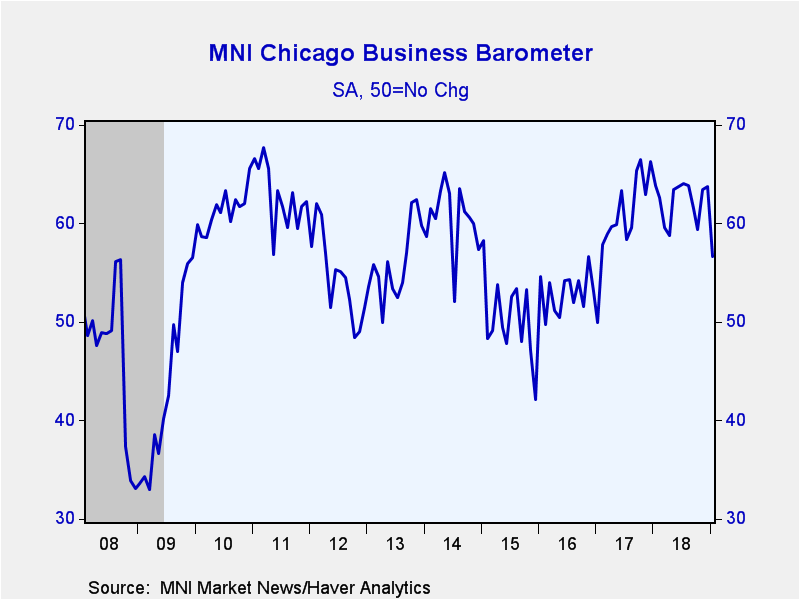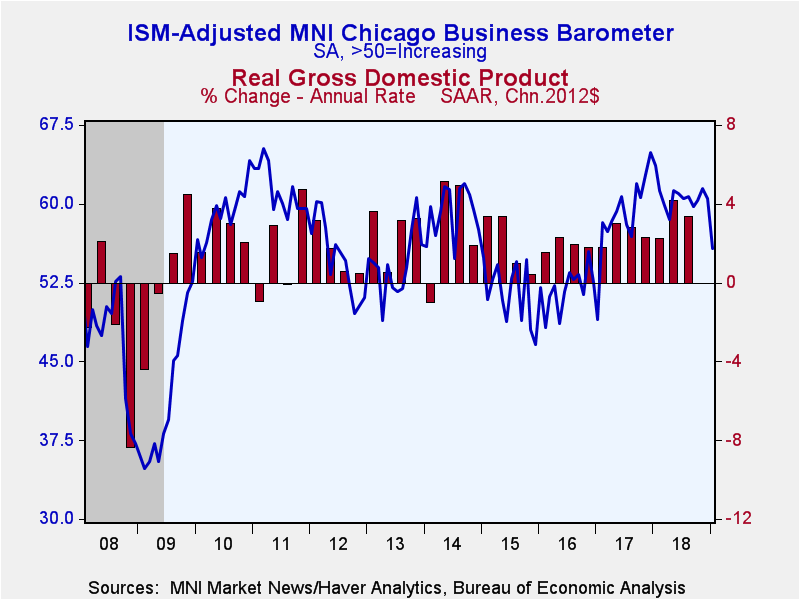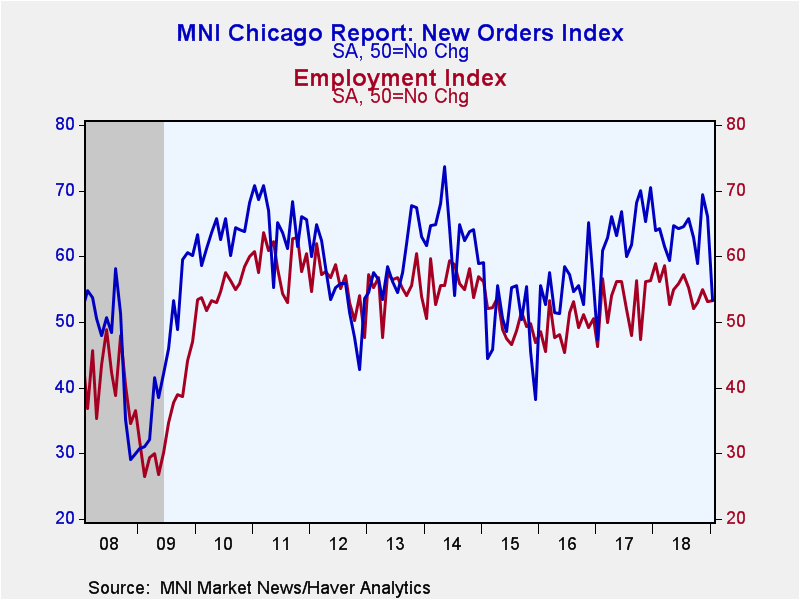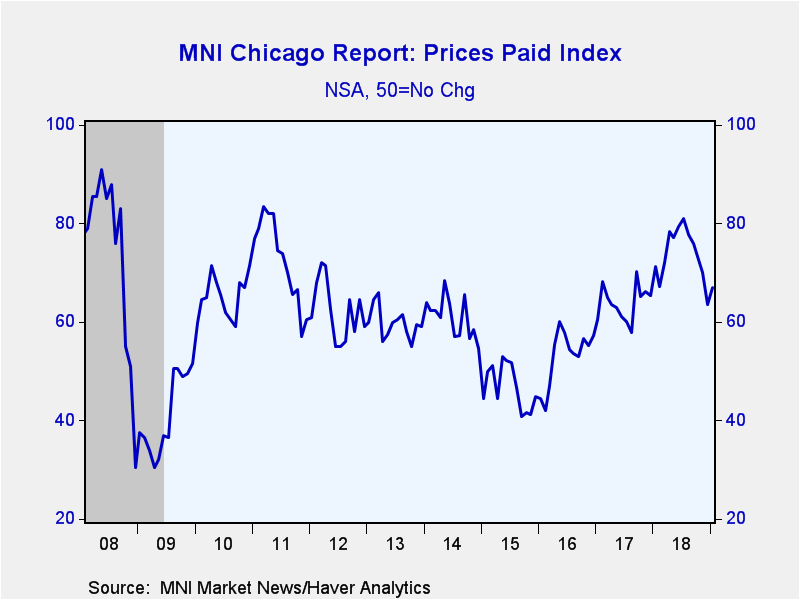 Global| Jan 31 2019
Global| Jan 31 2019U.S. Chicago Business Barometer Falls to 2-Year Low
Summary
The Chicago Purchasing Managers Business Barometer dropped to a two-year low of 56.7 in January from a downwardly-revised 63.8 in December. The Action Economics Forecast Survey expected 62.0. The Chicago Purchasing Managers figures [...]
The Chicago Purchasing Managers Business Barometer dropped to a two-year low of 56.7 in January from a downwardly-revised 63.8 in December. The Action Economics Forecast Survey expected 62.0. The Chicago Purchasing Managers figures are diffusion indexes where readings above 50 indicate growth.
Haver Analytics constructs an ISM-Adjusted Chicago Business Barometer with similar methodology as the ISM Composite Index. This index fell to 55.7, suggesting continued healthy growth, but at a slower pace than last year. The Chicago index has an 80% correlation with the national ISM Manufacturing Index, which is scheduled for release tomorrow.
All of the output related indexes declined, led by a 12.9 point drop in new orders to a two-year low of 53.2. Production fell 7.8 points to 58.8 while backlogs declined 5.7 points. After weakening for five consecutive months, the index of prices paid was unchanged at 67.0 in January. The prices paid measure hit a cycle high of 81.1 in July 2018.
The employment index edged up to 53.2. The proportion of survey respondents that indicated higher employment rebounded to 25% from 13%, though this was mostly offset by a 6 percentage point increase in respondents cutting payrolls (the respondent share data are not-seasonally adjusted).
The MNI Chicago Report is produced by MNI in partnership with ISM-Chicago. The survey covers a sample of over 200 purchasing professionals in the Chicago area with a monthly response rate of about 50%. Summary data are contained in Haver's USECON database, with detail including the ISM-style index in the SURVEYS database. The Action Economics Forecast Survey is available in AS1REPNA.
| Chicago Purchasing Managers Index (%, SA) | Jan | Dec | Nov | Jan '18 | 2018 | 2017 | 2016 |
|---|---|---|---|---|---|---|---|
| General Business Barometer | 56.7 | 63.8 | 63.5 | 63.9 | 62.4 | 60.7 | 53.0 |
| ISM-Adjusted General Business Barometer | 55.7 | 60.5 | 61.5 | 63.6 | 60.7 | 59.0 | 51.9 |
| Production | 58.8 | 66.6 | 63.5 | 69.1 | 64.5 | 64.2 | 54.5 |
| New Orders | 53.2 | 66.1 | 69.4 | 63.9 | 63.8 | 63.6 | 55.6 |
| Order Backlogs | 58.0 | 63.7 | 59.4 | 55.3 | 58.0 | 55.2 | 47.1 |
| Inventories | 52.6 | 54.9 | 53.2 | 61.0 | 55.3 | 54.9 | 47.2 |
| Employment | 53.2 | 53.1 | 55.0 | 58.9 | 55.2 | 52.9 | 49.4 |
| Supplier Deliveries | 60.5 | 61.6 | 66.4 | 65.3 | 64.8 | 59.4 | 52.8 |
| Prices Paid | 67.0 | 67.0 | 73.3 | 71.2 | 74.0 | 64.1 | 53.2 |
Gerald D. Cohen
AuthorMore in Author Profile »Gerald Cohen provides strategic vision and leadership of the translational economic research and policy initiatives at the Kenan Institute of Private Enterprise.
He has worked in both the public and private sectors focusing on the intersection between financial markets and economic fundamentals. He was a Senior Economist at Haver Analytics from January 2019 to February 2021. During the Obama Administration Gerald was Deputy Assistant Secretary for Macroeconomic Analysis at the U.S. Department of Treasury where he helped formulate and evaluate the impact of policy proposals on the U.S. economy. Prior to Treasury, he co-managed a global macro fund at Ziff Brothers Investments.
Gerald holds a bachelor’s of science from the Massachusetts Institute of Technology and a Ph.D. in Economics from Harvard University and is a contributing author to 30-Second Money as well as a co-author of Political Cycles and the Macroeconomy.
More Economy in Brief
 Global| Feb 05 2026
Global| Feb 05 2026Charts of the Week: Balanced Policy, Resilient Data and AI Narratives
by:Andrew Cates









